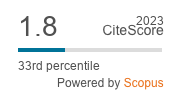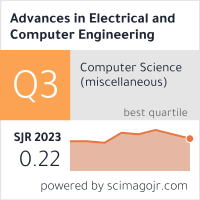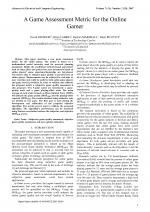| 2/2007 - 1 | View TOC | « Previous Article | Next Article » |
A Game Assessment Metric for the Online GamerDENIEFFE, D., CARRIG, B., MARSHALL, D., PICOVICI, D. |
| Extra paper information in |
| Click to see author's profile in |
| Download PDF |
Author keywords
subjective game quality assessment, objective game quality assessment, end-user opinion estimation
References keywords
References keywords will be displayed on the next page reload.
About this article
Date of Publication: 2007-11-03
Volume 7, Issue 2, Year 2007, On page(s): 3 - 6
ISSN: 1582-7445, e-ISSN: 1844-7600
Digital Object Identifier: 10.4316/AECE.2007.02001
Web of Science Accession Number: 000259903400001
Abstract
This paper describes a new game assessment metric for the online gamer. The metric is based on a mathematical model currently used for network planning assessment. Beside the traditional network-based parameters such as delay, jitter and packet loss, new parameters based on online players' game experience/knowledge are introduced. The metric aims to estimate game quality as perceived by an online player. Measurements can be achieved in real-time or near real-time and could be useful to both online game players and game service providers. In order to validate and calibrate the proposed metric a subjective game quality assessment is also proposed. Two 5-point scales are introduced: a game-quality scale and a game playing-effort scale. The mean average of each scales termed, as Mean Opinion Score (MOS), will indicate the game quality (MOSGQE) and the playing-effort required (MOSGPE). The results obtained using subjective tests are divided in two parts. The first part is used during the development and calibration of the proposed objective algorithm. The second part is used to validate the proposed algorithm. The algorithm's performance can be measured using Pearson correlation between the subjective and objective MOSGQE scores. |
| References | | | Cited By «-- Click to see who has cited this paper |
On-line references are not available - see the PDF file if available.
Faculty of Electrical Engineering and Computer Science
Stefan cel Mare University of Suceava, Romania
All rights reserved: Advances in Electrical and Computer Engineering is a registered trademark of the Stefan cel Mare University of Suceava. No part of this publication may be reproduced, stored in a retrieval system, photocopied, recorded or archived, without the written permission from the Editor. When authors submit their papers for publication, they agree that the copyright for their article be transferred to the Faculty of Electrical Engineering and Computer Science, Stefan cel Mare University of Suceava, Romania, if and only if the articles are accepted for publication. The copyright covers the exclusive rights to reproduce and distribute the article, including reprints and translations.
Permission for other use: The copyright owner's consent does not extend to copying for general distribution, for promotion, for creating new works, or for resale. Specific written permission must be obtained from the Editor for such copying. Direct linking to files hosted on this website is strictly prohibited.
Disclaimer: Whilst every effort is made by the publishers and editorial board to see that no inaccurate or misleading data, opinions or statements appear in this journal, they wish to make it clear that all information and opinions formulated in the articles, as well as linguistic accuracy, are the sole responsibility of the author.





